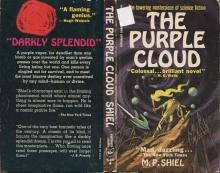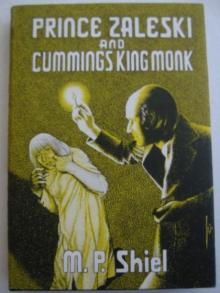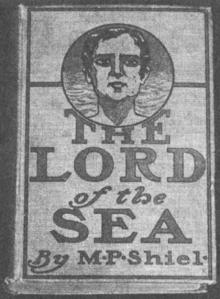- Home
- M. P. Shiel
The Purple Cloud Page 8
The Purple Cloud Read online
Page 8
and perhaps tostartle me with a false alarm in the very skin of the old Bruin whichhad so nearly done for him, he had thrown it round him on finishing itscleaning, and so, in mere wanton fun, had crept on deck at the hour ofhis watch. The head of the bear-skin, and the fog, must have preventedhim from seeing me taking aim.
This tragedy made me ill for weeks. I saw that the hand of Fate was uponme. When I rose from bed, poor Maitland was lying in the ice behind thegreat camel-shaped hummock near us.
By the end of January we had drifted to 80 deg. 55'; and it was then thatClark, in the presence of Wilson, asked me if I would make the fourthman, in the place of poor Maitland, for the dash in the spring. As Isaid 'Yes, I am willing,' David Wilson spat with a disgusted emphasis. Aminute later he sighed, with 'Ah, poor Maitland...' and drew in hisbreath with a _tut! tut!_
God knows, I had an impulse to spring then and there at his throat, andstrangle him: but I curbed myself.
There remained now hardly a month before the dash, and all hands set towork with a will, measuring the dogs, making harness and seal-skin shoesfor them, overhauling sledges and kayaks, and cutting every possibleounce of weight. But we were not destined, after all, to set out thatyear. About the 20th February, the ice began to pack, and the ship wassubjected to an appalling pressure. We found it necessary to maketrumpets of our hands to shout into one another's ears, for the wholeice-continent was crashing, popping, thundering everywhere in terrificupheaval. Expecting every moment to see the _Boreal_ crushed tosplinters, we had to set about unpacking provisions, and placingsledges, kayaks, dogs and everything in a position for instant flight.It lasted five days, and was accompanied by a tempest from the north,which, by the end of February, had driven us back south into latitude79 deg. 40'. Clark, of course, then abandoned the thought of the Pole forthat summer.
And immediately afterwards we made a startling discovery: our stock ofreindeer-moss was found to be somehow ridiculously small. Egan, oursecond mate, was blamed; but that did not help matters: the sad factremained. Clark was advised to kill one or two of the deer, but hepig-headedly refused: and by the beginning of summer they were all dead.
Well, our northward drift recommenced. Toward the middle of February wesaw a mirage of the coming sun above the horizon; there were flights ofArctic petrels and snow-buntings; and spring was with us. In an ice-packof big hummocks and narrow lanes we made good progress all the summer.
When the last of the deer died, my heart sank; and when the dogs killedtwo of their number, and a bear crushed a third, I was fully expectingwhat actually came; it was this: Clark announced that he could now takeonly two companions with him in the spring: and they were Wilson andMew. So once more I saw David Wilson's pleased smile of malice.
We settled into our second winter-quarters. Again came December, and allour drear sunless gloom, made worse by the fact that the windmill wouldnot work, leaving us without the electric light.
Ah me, none but those who have felt it could dream of one half themental depression of that long Arctic night; how the soul takes on thehue of the world; and without and within is nothing but gloom, gloom,and the reign of the Power of Darkness.
Not one of us but was in a melancholic, dismal and dire mood; and on the13th December Lamburn, the engineer, stabbed Cartwright, the oldharpooner, in the arm.
Three days before Christmas a bear came close to the ship, and thenturned tail. Mew, Wilson, I and Meredith (a general hand) set out inpursuit. After a pretty long chase we lost him, and then scattereddifferent ways. It was very dim, and after yet an hour's search, I wasreturning weary and disgusted to the ship, when I saw some shadow like abear sailing away on my left, and at the same time sighted a man--I didnot know whom--running like a handicapped ghost some little distance tothe right. So I shouted out:
'There he is--come on! This way!'
The man quickly joined me, but as soon as ever he recognised me, stoppeddead. The devil must have suddenly got into him, for he said:
'No, thanks, Jeffson: alone with you I am in danger of my life....'
It was Wilson. And I, too, forgetting at once all about the bear,stopped and faced him.
'I see,' said I. 'But, Wilson, you are going to explain to me _now_ whatyou mean, you hear? What _do_ you mean, Wilson?'
'What I say,' he answered deliberately, eyeing me up and down: 'alonewith you I am in danger of my life. Just as poor Maitland was, and justas poor Peters was. Certainly, you are a deadly beast.'
Fury leapt, my God, in my heart. Black as the tenebrous Arctic night wasmy soul.
'Do you mean,' said I, 'that I want to put you out of the way in orderto go in your place to the Pole? Is that your meaning, man?'
'That's about my meaning, Jeffson,' says he: 'you are a deadly beast,you know.'
'Stop!' I said, with blazing eye. 'I am going to kill _you_, Wilson--assure as God lives: but I want to hear first. Who _told_ you that Ikilled Peters?'
'Your lover killed him--with _your_ collusion. Why, I heard you, man, inyour beastly sleep, calling the whole thing out. And I was pretty sureof it before, only I had no proofs. By God, I should enjoy putting abullet into you, Jeffson!'
'You wrong me--you, you wrong me!' I shrieked, my eyes staring withravenous lust for his blood; 'and now I am going to pay you well for it._Look out, you!_'
I aimed my gun for his heart, and I touched the trigger. He held up hisleft hand.
'Stop,' he said, 'stop.' (He was one of the coolest of men ordinarily.)'There is no gallows on the _Boreal_, but Clark could easily rig one foryou. I want to kill you, too, because there are no criminal courts uphere, and it would be doing a good action for my country. But nothere--not now. Listen to me--don't shoot. Later we can meet, when all isready, so that no one may be the wiser, and fight it all out.'
As he spoke I let the gun drop. It was better so. I knew that he wasmuch the best shot on the ship, and I an indifferent one: but I did notcare, I did not care, if I was killed.
It is a dim, inclement land, God knows: and the spirit of darkness anddistraction is there.
Twenty hours later we met behind the great saddle-shaped hummock, somesix miles to the S.E. of the ship. We had set out at different times, sothat no one might suspect. And each brought a ship's-lantern.
Wilson had dug an ice-grave near the hummock, leaving at its edge aheap of brash-ice and snow to fill it. We stood separated by an intervalof perhaps seventy yards, the grave between us, each with a lantern athis feet.
Even so we were mere shadowy apparitions one to the other. The airglowered very drearily, and present in my inmost soul were the frills ofcold. A chill moon, a mere abstraction of light, seemed to hang faroutside the universe. The temperature was at 55 deg. below zero, so that wehad on wind-clothes over our anoraks, and heavy foot-bandages under ourLap boots. Nothing but a weird morgue seemed the world, haunted withdespondent madness; and exactly like that world about us were the mindsof us two poor men, full of macabre, bleak, and funereal feelings.
Between us yawned an early grave for one or other of our bodies.
I heard Wilson cry out:
'Are you ready, Jeffson?'
'Aye, Wilson!' cried I.
'_Then here goes!_' cries he.
Even as he spoke, he fired. Surely, the man was in deadly earnest tokill me.
But his shot passed harmlessly by me: as indeed was only likely: wewere mere shadows one to the other.
I fired perhaps ten seconds later than he: but in those ten seconds hestood perfectly revealed to me in clear, lavender light.
An Arctic fire-ball had traversed the sky, showering abroad, asulphurous glamour over the snow-landscape. Before the intenser blue ofits momentary shine had passed away, I saw Wilson stagger forward, anddrop. And him and his lantern I buried deep there under the rubble ice.
* * * * *
On the 13th March, nearly three months later, Clark, Mew and I left theBoreal in latitude 85 deg. 15'.
We had with us thirty-two dogs, three sl
edges, three kayaks, humanprovisions for 112 days, and dog provisions for 40. Being now about 340miles from the Pole, we hoped to reach it in 43 days, then, turningsouth, and feeding living dogs with dead, make either Franz Josef Landor Spitzbergen, at which latter place we should very likely come up witha whaler.
Well, during the first days, progress was very slow, the ice being roughand laney, and the dogs behaving most badly, stopping dead at everydifficulty, and leaping over the traces. Clark had had the excellentidea of attaching a gold-beater's-skin balloon, with a lifting power of35 pounds, to each sledge, and we had with us a supply of zinc andsulphuric-acid to repair the hydrogen-waste from the bags; but on thethird day Mew over-filled and burst his balloon, and I and Clark had tocut ours loose in order to equalise weights, for we could neither leavehim behind, turn back to the ship, nor mend the bag. So it happened thatat the end of

 The Purple Cloud
The Purple Cloud Prince Zaleski
Prince Zaleski Lord of the Sea
Lord of the Sea